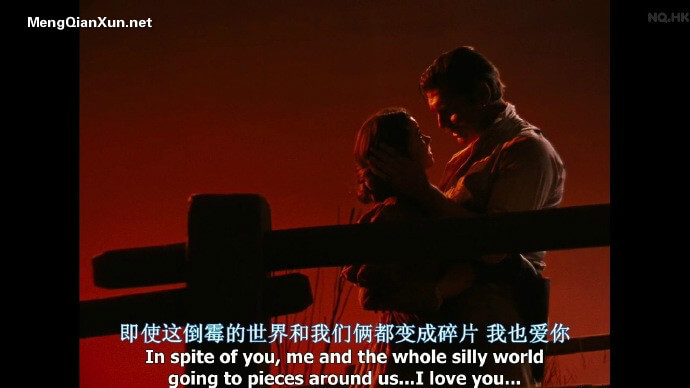《兵车行》是唐代大诗人杜甫创作的叙事诗。全诗以“道旁过者问行人”为界分为两段:首段摹写送别的惨状,是纪事;次段传达征夫的诉苦,是纪言。此诗具有深刻的思想内容,借征夫对老人的答话,倾诉了人民对战争的痛恨,揭露了唐玄宗长期以来的穷兵黩武,连年征战,给人民造成了巨大的灾难。全诗寓情于叙事之中,在叙述次序上参差错落前后呼应,变化开阖井然有序,并巧妙运用过渡句和习用词语,造成了回肠荡气的艺术效果。诗人自创乐府新题写时事,为中唐时期兴起的新乐府运动作出了开创性的贡献。
兵车行
杜甫
车辚辚,马萧萧,行人弓箭各在腰。
耶娘妻子[1]走相送,尘埃不见咸阳桥。
牵衣顿足拦道哭,哭声直上干[2]云霄。
道傍过者问行人,行人但云点行频[3]。
或从十五北防河,便至四十西营田[4]。
去时里正[5]与裹头[6],归来头白还戍边。
边庭流血成海水,武皇[7]开边意未已。
君不闻汉家山东二百州[8],千村万落生荆杞。
纵有健妇把锄犁,禾生陇亩无东西。
况复秦兵耐苦战,被驱不异犬与鸡。
长者虽有问,役夫敢申恨。
且如今年冬,未休关西卒[9]。
县官[10]急索租,租税从何出。
信知生男恶,反是生女好。
生女犹是嫁比邻[11],生男埋没随百草。
君不见青海头,古来白骨无人收。
新鬼烦冤旧鬼哭,天阴雨湿声啾啾。
注释:
[1] 妻子:妻和子女。
[2] 干:犯;冲。
[3] 点行频:多次点兵出征。
[4] 营田:戍边的士卒,兼从事垦荒工作。
[5] 里正:里长。唐制:百户为一里,里有里正,管户口、赋役等事。
[6] 与裹头:古以皂罗三尺裹头作头巾。因应征者年龄还小,故由里正替他裹头。
[7] 武皇:汉武帝,他在历史上以开疆拓土著称。这里暗喻唐玄宗。
[8] 山东二百州:指华山以东的广大土地。
[9] 关西卒:指此次应征出发的秦地士卒。
[10] 县官:指官府。
[11] 比邻:近邻。
版本1 – Song of the Conscripts
Du Fu
The conscripts march with bow and arrows at the waist.
Their fathers, mothers, wives and children come in haste
To see them off; the bridge is shrouded in dust they’ve raised.
They clutch at their coats, stamp the feet and bar the way;
Their grief cries loud and strikes the cloud straight, straight away.
An onlooker by roadside asks an enrollee.
“The conscription is frequent,” only answers he.
Some went north at fifteen to guard the river shore,
And were sent west to till the land at forty.
The elder bound their young heads when they went away;
Just home, they’re sent to the frontier though their hair’s gray.
The field on borderland becomes a sea of blood;
The emperor’s greed for land is still at high flood.
Have you not heard
Two hundred districts east of the Hua Mountains lie,
Where briers and brambles grow in villages far and nigh?
Although stout women can wield the plough and the hoe,
Thorns and weeds in the east as in the west o’ergrow.
The enemy are used to hard and stubborn fight;
Our men are driven just like dogs or fowls in flight.
You are kind to ask me
To complain I’m not free.
In winter of this year
Conscription goes on here.
The magistrates for taxes press.
How can we pay them in distress?
If we had known sons bring no joy,
We would have preferred girl to boy.
A daughter can be wed to a neighbor, alas!
A son can only be buried under the grass?
Have you not seen on borders green
Bleached bones since olden days unburied on the plain?
The old ghosts weep and cry, while the new ghosts complain;
The air is loud with screech and scream in gloomy rain.
The poet criticizes the Bright Emperor of the Tang Dynasty for his conscription of soldiers in war.
版本2 – Song of the Wagons
Du Fu
The horses whinny and neigh,
The conscripts each have bows and arrows at their waists.
Their parents, wives and children run to see them off,
So much dust’s stirred up, it hides the Xianyang bridge.
They pull clothes, stamp their feet and, weeping, bar the way,
The weeping voices rise straight up and strike the clouds.
A passer-by at the roadside asks a conscript why,
The conscript answers only that drafting happens often.
“At fifteen, many were sent north to guard the river,
Even at forty, they had to till fields in the west.
When we went away, the elders bound our heads,
Returning with heads white, we’re sent back off to the frontier.
At the border posts, shed blood becomes a sea,
The martial emperor’s dream of expansion has no end.
Have you not seen the two hundred districts east of the mountains,
Where thorns and brambles grow in countless villages and hamlets?
Although there are strong women to grasp the hoe and the plough,
They grow some crops, but there’s no order in the fields.
What’s more, we soldiers of Qin withstand the bitterest fighting,
We’re always driven onwards just like dogs and chickens.
Although an elder can ask me this,
How can a soldier dare to complain?
Even in this winter time,
Soldiers from west of the pass keep moving.
The magistrate is eager for taxes,
But how can we afford to pay?
We know now having boys is bad,
While having girls is for the best;
Our girls can still be married to the neighbours,
Our sons are merely buried amid the grass.
Have you not seen on the border of Qinghai,
The ancient bleached bones no man’s gathered in?
The new ghosts are angered by injustice, the old ghosts weep,
Moistening rain falls from dark heaven on the voices’ screeching.”
单词详解:
在这些翻译版本中,出现了一些可能对英语学习者来说难度较大的单词和短语,下面是对这些单词的详细解释:
- Conscripts – 名词,意为“应征入伍的人”,“征兵”。在古代中国,这个词指的是被征召入伍的士兵。
- Rumble – 动词,意为“隆隆作响”,“发出低沉的轰鸣声”。在这里用来描述车轮滚动的声音。
- Whinny – 动词,意为“马嘶”,“发出尖锐的叫声”。
- Shrouded – 形容词,意为“被遮盖的”,“被隐藏的”。在这里用来描述咸阳桥被尘埃遮盖的情景。
- Grief – 名词,意为“悲伤”,“悲痛”。在这里用来描述送别亲人时的情感。
- Strikes – 动词,意为“撞击”,“击打”。在这里用来形象地描述哭声如何“撞击”云霄。
- Enrollee – 名词,意为“被录取的人”,“新兵”。在这里指的是被征召入伍的新兵。
- Guard – 动词,意为“守卫”,“保护”。在这里指的是守卫边疆。
- Till – 动词,意为“耕作”,“耕种”。在这里指的是士兵在边疆从事垦荒工作。
- Bleed – 动词,意为“流血”,“出血”。在这里形象地描述战场的惨烈。
- Martial – 形容词,意为“军事的”,“战争的”。在这里指的是皇帝的军事扩张。
- Briers – 名词,意为“荆棘”,“灌木丛”。在这里用来描述荒废的村庄。
- Hoe – 名词,意为“锄头”,一种农具。在这里用来描述女性在田间劳作。
- Magistrate – 名词,意为“地方官员”,“法官”。在这里指的是负责征税的官员。
- Press – 动词,意为“催促”,“逼迫”。在这里用来描述官员催促缴纳税款。
- Afford – 动词,意为“负担得起”,“支付得起”。在这里用来表达农民无法负担税款的困境。
- Buried – 动词,意为“埋葬”,“掩埋”。在这里用来描述士兵战死沙场的悲惨命运。
- Bleached – 形容词,意为“漂白的”,“褪色的”。在这里用来描述白骨在阳光照射下的颜色。
- Injustice – 名词,意为“不公正”,“冤屈”。在这里用来描述新鬼对旧鬼的抱怨。
- Screech – 名词,意为“尖叫声”,“尖锐刺耳的声音”。在这里用来描述阴雨天气中鬼魂的哭泣声。
这些单词和短语在描述古代战争和士兵生活的场景中被使用,它们传达了一种悲壮和无奈的情感。在英语学习中,理解这些词汇的含义和用法有助于学生更好地理解古代诗歌和历史背景。
未经允许不得转载:帕布莉卡 » 杜甫《兵车行》 -经典诗词英译-中英双语赏析
 帕布莉卡
帕布莉卡


 爱是一颗心遇到另一颗心(出处+配图)
爱是一颗心遇到另一颗心(出处+配图)  《乱世佳人》电影专题
《乱世佳人》电影专题

